On the Road is a weekday feature spotlighting reader photo submissions.
From the exotic to the familiar, whether you’re traveling or in your own backyard, we would love to see the world through your eyes.
JanieM
I spent my first full day in China visiting Tiananmen Square and the Forbidden City. There are several shots of that complex in this set, plus a few other Beijing scenes.
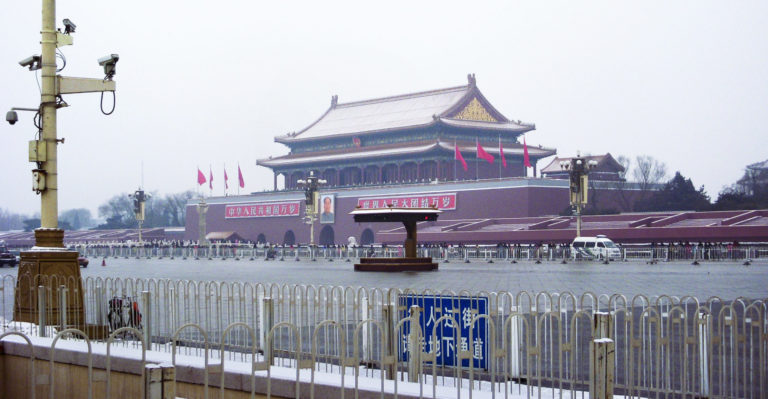
First sight of the complex as we walked toward it from the subway stop.
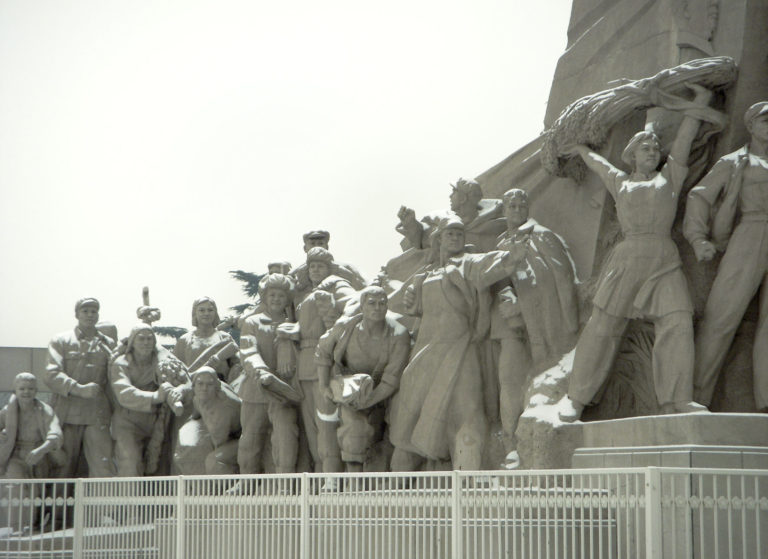
One of several huge sculptures, this one honoring workers.
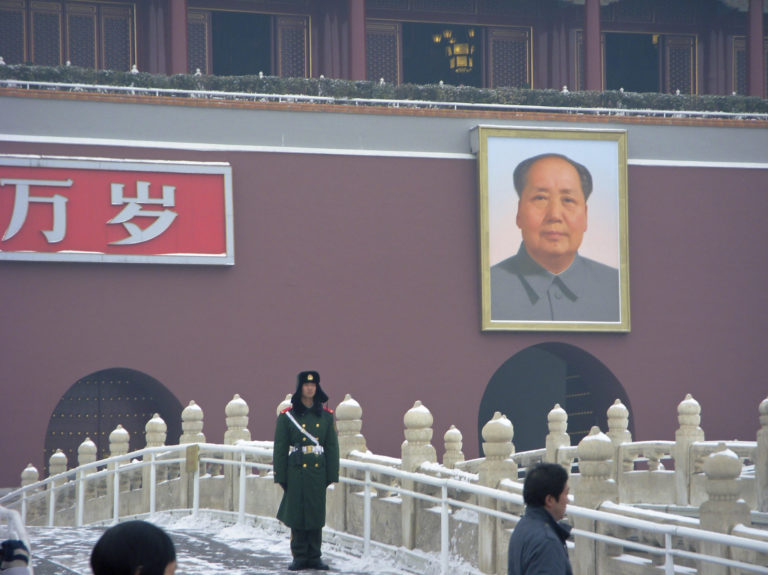
The soldier just stood there as visitors walked past on their way in and out. As soon as we were inside, people walked up to us and tried to get us to hire them as guides for a trip to the Great Wall. Jamie had his own tentative plan for that, but we took a business card from one young man anyhow, since he was friendly without being pushy like the others.
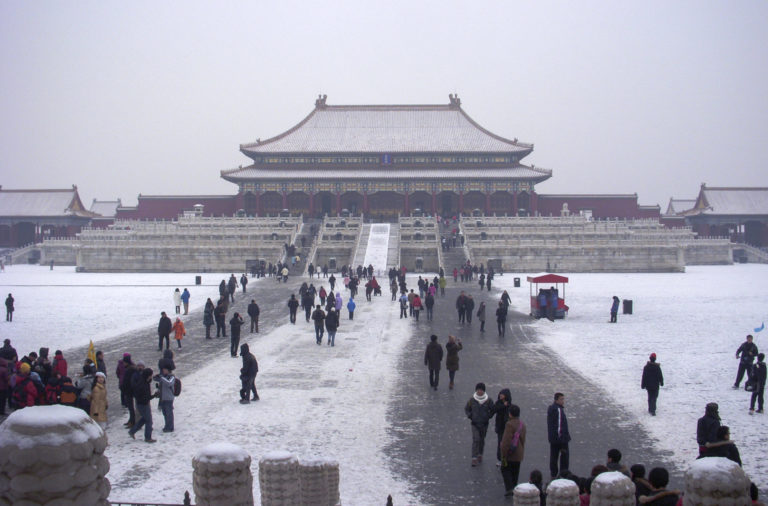
The courtyard just inside the entrance. Kids were on school holiday because of Spring Festival, so there were a lot of families visiting.
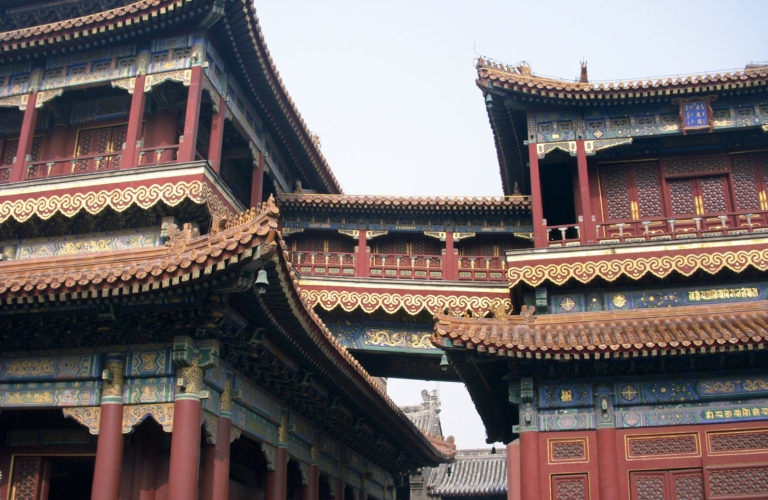
Also known as the Lama Temple. This is one of the main buildings in another fairly big complex. Not being up on the situation of religion in modern China, I was a little surprised to see that a lot of the visitors weren’t just curious tourists. There were vendors selling incense sticks that people bought to burn in front of the statues. A favorite Chinglish sign: “Don’t burn incense & film in the hall.”
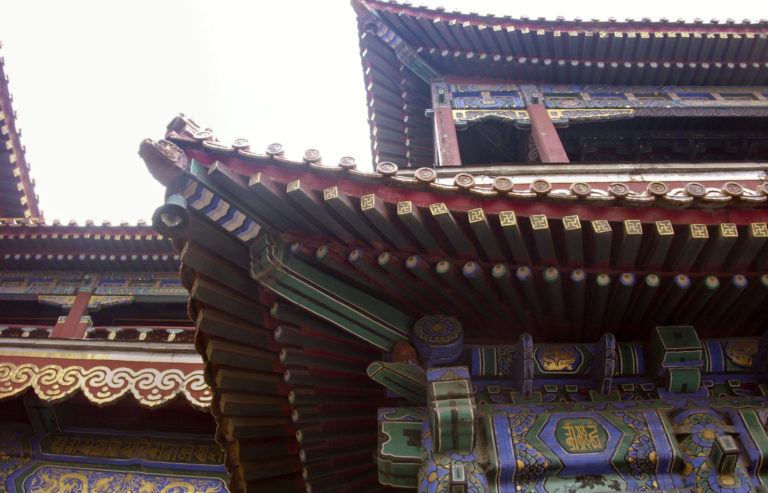
Closer detail of the building in the previous picture.
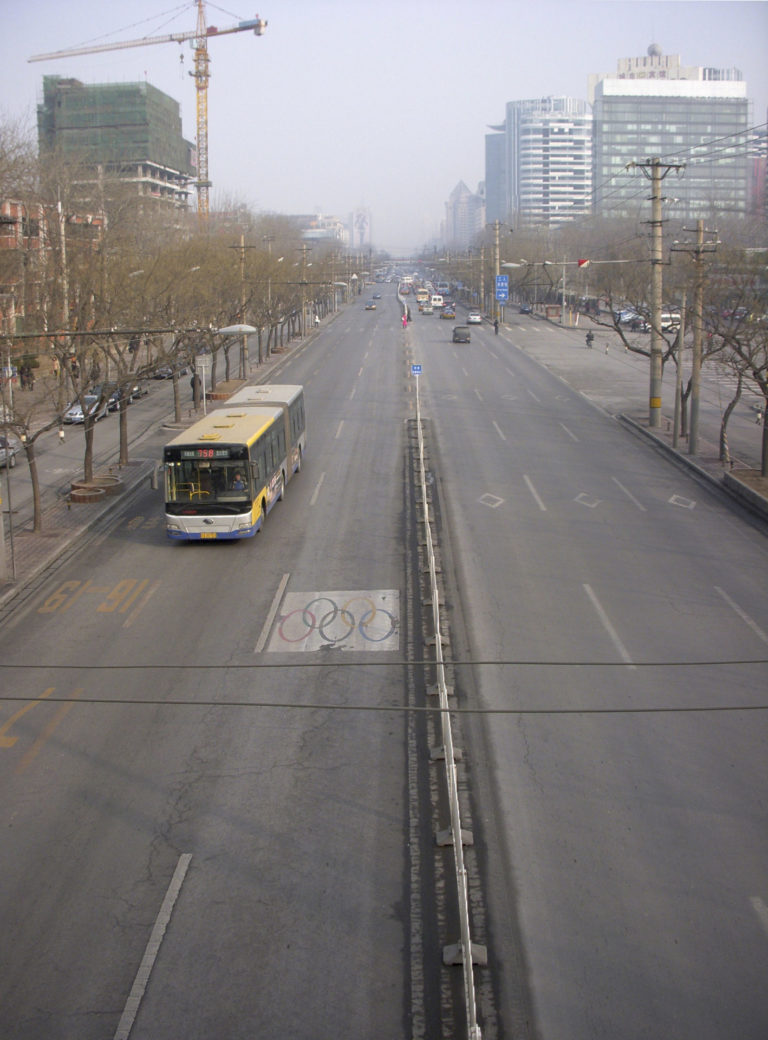
This was fairly typical air quality during my visit. One of the days in Beijing was a little brighter than this, and Jamie, who had been in China for about twenty months without a break at that point, commented on what a nice blue sky it was. I said, “You’re going to have some reacclimating to do when you get home.”
This was not, however, typical traffic. The traffic was insane most of the time. The widest street I saw in Beijing had seven busy auto lanes in each direction, plus a narrower lane next to the curb on each side for pedaled vehicles, donkey carts, etc. Driving habits were wildly unpredictable for someone new to China. Pedestrians and left turning traffic often had green lights at the same time, and a mob of pedestrians would thread its way through a mob of slowly moving cars, the drivers tooting their horns the whole time. Drivers, in fact, tooted their horns often and for no discernible reason. Check out Peter Hessler’s essay “Country Driving” (in his book of the same name) for a hilarious account of driver education, and driving in general, in a country that moved very fast from most people not knowing how to drive to millions of people learning in a hurry.
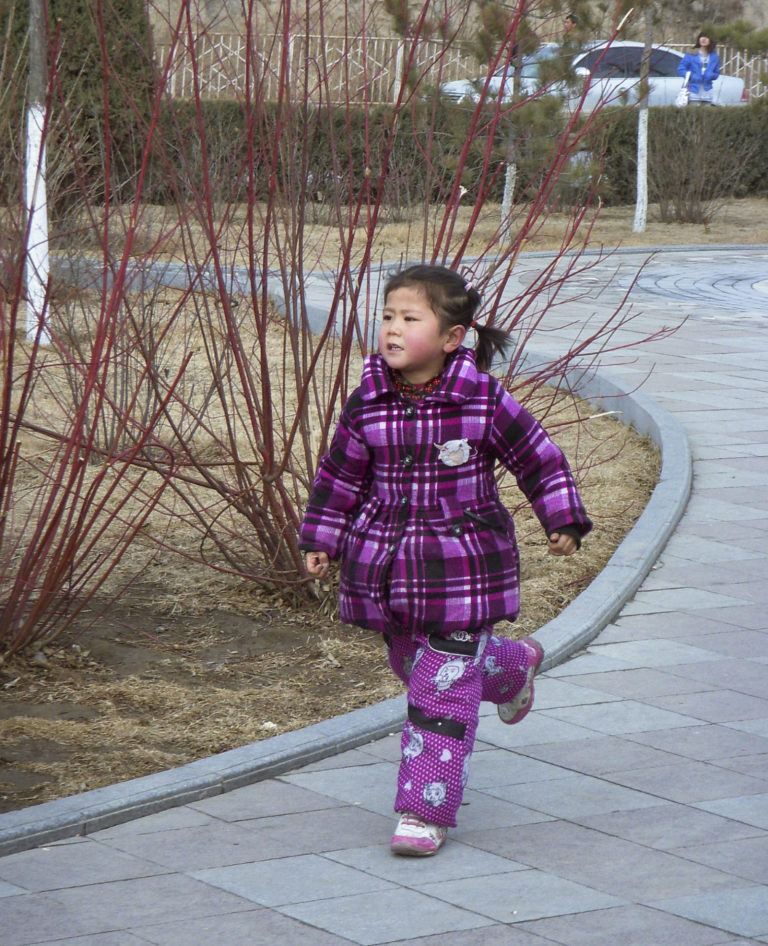
As in Alaska when I visited in February long ago, people didn’t let winter keep them indoors, they bundled up and went outside even if only to hang out. The houses are very, very small by our standards, and Jamie said that they’re not kept all that warm, so people layer up even indoors. This was certainly true in the homes we visited for holiday celebrations.

p.a.
Great shots, thanks!
Laura Too
Thank you, I love knowing there will be more to come! Country Driving is one of my favorite books.
Pete Mack
That first shot of the Forbidden City really showcases the Chinese surveillance state. That is a really in-your-face reminder that Big Brother is watching you.
Lovely pics.
YY_Sima Qian
@Pete Mack: This is the Tiananmen Square, probably the moser thoroughly surveilled space in all of China.
Elma
The group tour I was with in China had a tour leader and local city guides. When we arrived in Tiananmen Square several people tried to ask our local guide questions about the protests. She flatly refused to talk about it, saying loudly that she was there to show us the sights not to discuss politics. We concluded that she believed she was being monitored. She was using one of those “Whisper” microphones that broadcast a few feet to our little earphones; so she may have thought, known that someone could be listening in. Later, away from the square, our tour leader spoke quite freely about it.
UncleEbeneezer
Neat. We’ve been watching YT videos that feature Northern VN and Southern China and it’s gotten us more interested in that as a potential future trip. The scenery is more mountains, greenery, waterfalls etc., and air quality seems much better. I must say, when flying into Cambodia, the thick layer of smog we could see from the plane was very disheartening. Air quality is one of the reasons we aren’t dying to visit China. We have a friend who lived there for about five years, and every picture he posted was pretty terrible AQ. I’m sure there are good days too, but I’m not sure I could hang with so many bad ones. Thanks for sharing the pix!
JanieM
Thanks for all the comments!
As to air quality — it was better in Yulin, where I spent the four weeks after Beijing. But it wasn’t great even there, partly because of the dusty landscape. In fact, a dust storm was blowing up the day I was leaving, and we were afraid my plane wouldn’t fly. But the storm veered off and all was well.
As to surveillance — My only other overseas trip since the China adventure was to London, which is also heavily surveilled. For China, I wonder if I’d be more worried now, since relations with the US are worse than they were in 2010. But I wasn’t thinking much about it then.
Yutsano
@YY_Sima Qian: For good reason. At least the Chinese Communist party thinks so.
Your country is so beautiful. It’s sad that for security reasons I can’t go at this time.
J R in WV
Thanks for sharing your photos.
We’ll probably never visit China, for many reasons. Great photos, looking forward to the rest of the series!
YY_Sima Qian
The terrible Sino-US political relations does not impact how average Americans are treated by average Chinese, or even the government bureaucracy. None of my American colleagues on expatriate assignment or business trips to China have ever been harassed because they are American. I just had my residence permit renewed at the beginning of the year with zero hassle. Chinese Americans sometimes have to deal with the expectations that they are Chinese, and African Americans can encounter stereotyping (as with Africans), but overall I would say China is actually fairly friendly to foreigners. Now that Trump is out of the office, American visitors can expect fewer bewildered questions about how Trump made it to the presidency, though they can expect equally bewildered questions about the US’ pandemic response. I get asked all the time.
As for pollution, 2010 definitely is in the middle of the worse “airpocalyse” days in northern China, especially Beijing. I used to dread business trips to Beijing back in the late 00s and early 10s. Flying in from southeastern China, 45 mins out from Beijing (when still over Shandong Province), sometimes I would look down and see the ground below completely obscured under a dense blanket of smog, on a clear day. I would know that the next couple days in Beijing would be rough for my eyes, nose and throat. Since then, air quality has improved steadily across the country, especially in northern China (Beijing & Tianjin Municipalities, Hebei, Shandong, Shanxi & Shaanxi Provinces), where heavy industry is still concentrated. Mind you, air quality in winter can still be bad by international standards (AQI > 150 or 200 on the bad days), but far cry from the “airpocalyse” days several years ago (AQI > 400 or 500).
Beijing used to experience multiple sandstorms each spring, originating from the Chinese parts of the Gobi Desert, which had been expanding due to overgrazing of the neighboring grasslands. A decade of dedicated desert control, grazing cap and tree planting efforts have greatly reduced such sandstorms in the last few years. There was a bad one in Beijing a couple of weeks ago, but apparently it originated from the Mongolian part of the Gobi, where overgrazing is causing rapid desertification.
Of course, it will be quite some time yet before international travel can resume. I used to spend the occasional weekend in Hong Kong or Macau for eating and shopping. Not any more. My Chinese residence permit would not be recognized if I try to reenter Mainland China, while COVID-19 restriction policies remain in place.
JanieM
@YY_Sima Qian: Thanks for all that. It’s good to know that air quality has been improving. And I was certainly never harassed — on the contrary I felt very welcome among my son’s colleagues, although we did get some unfriendly glances on the street. One woman at a bus stop in Yulin gave us a pep talk about how my son ought to move there permanently, and she asked him to ask me how I felt about that. I said I’d miss him. She said “Oh, no, you have to come too. Yulin has the best water in the world for your skin.” I wasn’t sure where that came from, but it was meant in a friendly way.
As to this:
It reminds me of being in Ireland and being expected to answer for Reagan. I could but shrug.
YY_Sima Qian
@Yutsano: Security reasons?
dnfree
@Elma: On our tour in 2008, our guide told us not to mention Falun Gong in Tiananmen square. One of our members said rather loudly, “Why can’t we say Falun Gong?” and I thought our guide would have a heart attack.
dnfree
We enjoyed the English translations of signs, too. One of my favorites was at the exit from the expressway to Xian, home of the terra cotta warriors (which is an awesome sight). The exit had an arrow pointing to the “worriers”. In my mind I pictured a bunch of The Thinker statues.
But exchanging an o for an a in English was trivial compared to the subtleties of their language. Our Chinese guide told us that the word that sounds in English like “ma” actually has four different meanings depending on how it’s pronounced. He rattled off a fun phrase demonstrating this, (I think two of the meanings were mother and horse), and I had trouble hearing the difference.
JanieM
@dnfree: For someone like me who is casually fascinated with language, this is a huge topic. I was in China long enough to start getting accustomed to the rhythms and tones of Mandarin, but not long enough to really comprehend what people were saying. If I were less shy, I would probably have been braver about trying things out and looking like an idiot. When I tried to say “thank you” in stores, people were delighted, although in my son’s opinion (he’s a hard taskmaster :-) my accent was execrable.
My son sometimes helped judge speeches in a student English contest. I saw printed copies of some of the speeches and was fascinated by the way they could be fine as to English grammar and usage, but were still not anything like a native speaker would write. I’m sure vice versa would be true as well, for all except extremely experienced bilingual people.
dnfree
@JanieM: our trip was through the University of Chicago alumni association, and they do things up right. (Probably why the food we had was so fantastic.). They sent with a professor who apparently spoke impeccable Mandarin, and the reaction of Chinese people from waiters on up was uniformly thrilled. He had the unfortunate habit of arguing history with our Chinese guide, though.
dnfree
@JanieM: Also, to your point about the written English of students, at one point I got involved in helping Korean grad students edit their theses to make them sound more like native English. This was in the 1960s. One of the things I had to ask them to remove was expressions of extreme humility and unworthiness. I also remember one student using “vision” where we would say “seeing”. I could see that some of the distinctions could be subtle.
Pete Mack
@dnfree:
Generally speaking, the less said about Falun Gong the better. It’s the Chinese answer to Scientology, and just as nutty. (200000 years ago, aliens visited the Earth nutty.)